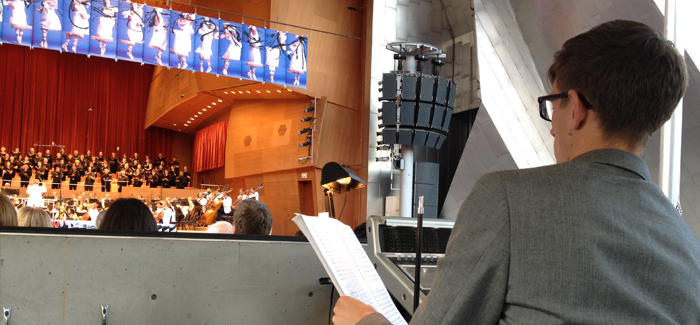
(Photography by Derek Tsang, ’15)
From playing violin to writing music to steeping literature-inspired tea, Estlin Usher, AB’13, remains composed.
When the Grant Park Symphony Orchestra played at Millenium Park this season, the personality of conductor Carlos Kalmar took center stage. But the Jay Pritzker Pavilion’s unique sound design—speakers on the trellis and a stainless-steel headdress that replicate concert hall acoustics outdoors—means there’s another performance as important and intimate happening in the sound booth.
There it’s a two man show—a surly sound engineer manages the mix as Estlin Usher, AB’13, reads the score and feeds him cues.
Usher, the Grant Park Music Festival’s operations assistant, says that score reading is his favorite part of the job—“I’m privileged to be in the best seat in the house”—but it’s not the only one. He’s also responsible for booking travel for guests, taking care of the artists, and generally doing whatever pops up. I spoke to him on his second to last day of work, and even then he was leaving a desk covered with a visiting conductor’s visa application to grab a bucket of ice for Kalmar.
Amid the preperformance bustle, Usher is at ease, shifting gears from bantering with the setup men to receiving the praises of the festival’s director to intercepting guests to answering my questions. As an undergraduate, Usher spent two years in a similar backstage role for University of Chicago Presents and a summer interning for the New York Youth Symphony. He’s pragmatic about his nonstop barrage of tasks. “I do as much as I can,” he says, “and try not to be anxious. I’d rather be happy.” He repeats this refrain when asked about his decision to work in the arts.
It’s work, too, that he’s proud of. It’s what actually gets music to an audience, which, Usher says, is “the point.”
[[{"type":"media","view_mode":"media_original","fid":"870","attributes":{"alt":"","class":"media-image","height":"505","typeof":"foaf:Image","width":"460"}}]]
Usher is much more, though, than just an enthusiast and an organizer. He plays violin and is in the process of applying to graduate schools for music composition and art organizing. Right now he’s working on a piece for orchestra of what he calls “philosophical music,” referencing the writings of French composer Pierre Boulez.
“Most songs explore a melody, a series of notes,” he explains. What he wants to look at instead is the “fundamental characteristics of an individual note, its timbre, and its overtones.”
Usher, who was homeschooled (and loved it) on his parents’ farm in Shoreham, Vermont, says that his interest in composition stems from one of his music teachers at the University of Vermont, where as a 14-year-old he started taking classes in music, math, and the humanities. He says that he tried to keep his age to himself, but as he collaborated and even informally tutored other students, they figured him out. “I felt like kind of an asshole,” he says, “but I was just trying to help” them with their classwork.
At the University of Chicago, Estlin’s coalescing interest in composition had him asking more and more fundamental questions about the character of music and why we even listen in the first place. He ended up double majoring in music theory and composition and philosophy, writing a BA paper on Plato’s concept of mimesis, a loaded term that can mean anything from imitation to presentation to the act of expression.
Although there wasn’t much for him in the dorms—the “continuous social aspect” wasn’t for him, he says—Estlin found plenty to do at college. He played in the orchestra, sang in the choir, organized for theater, managed Hallowed Grounds, and even won a barista competition for his “Molly Bloom,” a mix of berry tea and coffee that drew its name from Joyce’s Ulysses. As a DJ for two quarters at WHPK, he also played a combination of avant-garde classical, free jazz, and experimental popular music. And he helped organize the station’s live, in-studio shows, setting the stage for his next gig—a marketing assistant at 98.7 WFMT, Chicago’s classical station.
This is all a long way of saying that Estlin Usher was almost overqualified to be turning the pages behind the scenes. During a rehearsal of the orchestra’s last Friday performance of the season—Stravinsky’s Rite of Spring and John Adams’s Black Gondola and Harmonium, the latter based on poems by John Donne and Emily Dickinson—Usher missed a crucial bass cue for Harmonium. When performance time came, though, he showed his chops and delivered the cue, as quiet and unassuming as you please.
